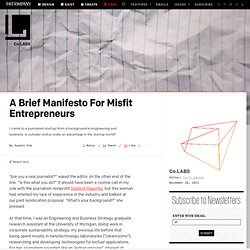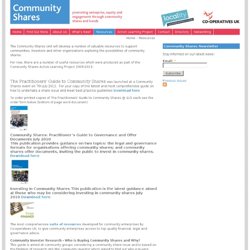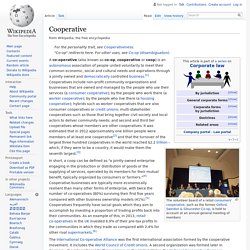

Welcome to Forbes. A Brief Manifesto For Misfit Entrepreneurs ⚙ Co. “Are you a real journalist?”

Asked the editor on the other end of the line. “Is this what you do?” It should have been a routine call in my role with the journalism nonprofit Student Reporter, but this woman had smelled my lack of experience in the industry and balked at our paid syndication proposal. “What’s your background?” She pressed. At that time, I was an Engineering and Business Strategy graduate research assistant at the University of Michigan, doing work in corporate sustainability strategy; my previous life before that being spent mostly in nanotechnology laboratories (“cleanrooms”), researching and developing technologies for biofuel applications. Today, I work on Student Reporter professionally, and we’re on track to incorporate as a business news outlet for young people, leveraging our global network of experimental newsrooms. What Good Is Fresh Thinking? An Entrepreneur’s Scientific Method This is the classic scientific method. So what’s different?
Wealth creation and macroeconomics: The parasite problem. Alex Osterwalder on Business Model Innovation. Community Shares. The Community Shares Unit will develop a number of valuable resources to support communities, investors and other organsiations exploring the possibilities of community shares.

For now, there are a number of useful resources which were produced as part of the Community Shares Action Learning Project 2009-2011: The Practitioners' Guide to Community Shares was launched at a Community Shares event on 7th July 2011. For your copy of this latest and most comprehensive guide on how to undertake a share issue and meet best practice guidelines Download here To order printed copies of The Practitioners' Guide to Community Shares @ £15 each see the order form below (bottom of page word document) Community Shares: Practitioner’s Guide to Governance and Offer Documents July 2010 This publication provides guidance on two topics: the legal and governance formats for organisations offering community shares; and community shares offer documents, inviting the public to invest in community shares.
Cooperative. In short, a coop can be defined as "a jointly owned enterprise engaging in the production or distribution of goods or the supplying of services, operated by its members for their mutual benefit, typically organized by consumers or farmers.

"[4] Cooperative businesses are typically more economically resilient than many other forms of enterprise, with twice the number of co-operatives (80%) surviving their first five years compared with other business ownership models (41%).[5] Cooperatives frequently have social goals which they aim to accomplish by investing a proportion of trading profits back into their communities. As an example of this, in 2013, retail co-operatives in the UK invested 6.9% of their pre-tax profits in the communities in which they trade as compared with 2.4% for other rival supermarkets.[6] The International Co-operative Alliance was the first international association formed by the cooperative movement. It includes the World Council of Credit Unions. Origins[edit] Mondragon Corporation. Mondragon cooperatives operate in accordance with Statement on the Co-operative Identity maintained by the International Co-operative Alliance.

History[edit] The determining factor in the creation of the Mondragon system was the arrival in 1941 of a young Catholic priest José María Arizmendiarrieta in Mondragón, a town with a population of 7,000 that had not yet recovered from the Spanish Civil War: poverty, hunger, exile and tension.[2] In 1943, Arizmendiarrieta established a technical college that became a training ground for generations of managers, engineers and skilled labour for local companies, and primarily for the co-operatives.[3] Before creating the first co-operative, Arizmendiarrieta spent a number of years educating young people about a form of humanism based on solidarity and participation, in harmony with Catholic Social Teaching, and the importance of acquiring the necessary technical knowledge.
The first 15 years were characterised by enormous dynamism. Finance[edit]